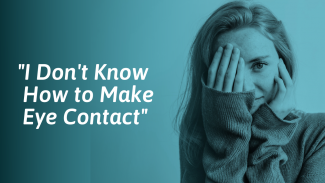
Potential Reasons for Avoiding Eye Contact
There are several potential reasons why someone may suddenly start avoiding eye contact. Understanding the underlying causes can provide valuable insights and help address the issue compassionately. Here are seven possible reasons for this behavior:




- Social Anxiety and Discomfort
- People with social anxiety disorder (SAD) often avoid eye contact as a coping mechanism to minimize feelings of anxiety, scrutiny, and negative evaluation by others. This behavior stems from the discomfort and hyperarousal they experience when making direct eye contact.
- Individuals with high levels of social anxiety, even without a diagnosed disorder, may also feel overwhelmed and uncomfortable with sustained eye contact, leading them to avoid it.
- Low Self-Esteem and Shame
- Those with low self-esteem may avoid eye contact due to feelings of unworthiness, inferiority, or lack of confidence. The avoidance of eye contact can be a way to protect oneself from perceived judgment or criticism.
- Shame, which is often linked to low self-esteem, can also contribute to eye contact avoidance. Individuals experiencing shame may feel the need to hide or withdraw from direct interaction.
- Neurodevelopmental Disorders
- Autism spectrum disorder (ASD) is often associated with difficulties in maintaining eye contact, as it can be overstimulating and overwhelming for many individuals on the autism spectrum. They may find eye contact too emotionally and physically distressing, leading them to avoid it as a coping mechanism.
- Attention-Deficit/Hyperactivity Disorder (ADHD) can also make it challenging for some individuals to maintain prolonged eye contact due to their high energy levels and difficulties in focusing.
- Past Trauma and PTSD
- Individuals who have experienced past trauma, such as abuse or neglect, may avoid eye contact as a way to protect themselves and regulate their emotional responses. This behavior can be a manifestation of post-traumatic stress disorder (PTSD).
- Cultural Differences and Norms
- In some cultures, avoiding eye contact is a sign of respect and politeness, particularly when interacting with elders or authority figures. The interpretation of eye contact can vary significantly across different cultural contexts.
- Romantic Attraction and Concealing Feelings
- Someone may suddenly avoid eye contact if they have developed romantic feelings for the person they are interacting with, as they may feel self-conscious or afraid of revealing their true emotions.
- Disinterest, Anger, or Distraction
- Avoidance of eye contact can also be a sign of disinterest, anger, or distraction. The individual may be bored, upset, or preoccupied with their own thoughts, leading them to disengage from the interaction.
It’s important to note that these reasons are not mutually exclusive, and in some cases, a combination of factors may contribute to the sudden avoidance of eye contact. Considering the context, the person’s overall behavior, and any underlying issues can help determine the root cause and guide an appropriate response.
Addressing and Supporting Individuals Struggling with Eye Contact
Approaching individuals who are avoiding eye contact with understanding, empathy, and a willingness to provide support can make a significant difference. Here are some strategies to consider:
- Fostering a Supportive Environment
- Creating a safe, non-judgmental, and accepting environment can go a long way in helping individuals feel comfortable and able to communicate authentically, regardless of their eye contact preferences.
- Avoiding pressure or expectations around eye contact, and instead focusing on the quality of the interaction and connection, can be especially beneficial for those with neurodevelopmental disorders or social anxiety.
- Gradual Exposure and Skill-Building
- For individuals who struggle with eye contact due to shyness, social anxiety, or lack of confidence, gradual exposure and practice in safe, supportive environments can help build their comfort and skills.
- Techniques like practicing in front of a mirror, finding a balanced approach to eye contact, and seeking communication coaching can be valuable in developing this non-verbal communication ability
- Promoting Neurodiversity and Acceptance
- Educating oneself and others about the diverse experiences and needs of individuals with neurodevelopmental conditions, such as autism and ADHD, can foster a more inclusive and understanding environment.
- Embracing the authenticity of individual communication styles, including asynchronous eye contact, and refraining from making assumptions or judgments can create a more welcoming and supportive atmosphere.
- Addressing Underlying Emotional Factors
- For those whose eye contact avoidance is rooted in emotional factors like low self-esteem, shame, or past trauma, providing access to mental health support and therapeutic interventions can be instrumental in addressing the underlying issues.
- Encouraging self-compassion, building self-awareness, and fostering healthy coping mechanisms can empower individuals to manage their discomfort and engage more comfortably in social interactions.
- Considering Cultural Differences
- Recognizing and respecting the cultural norms and expectations surrounding eye contact can help navigate cross-cultural interactions with sensitivity and understanding.
- Educating oneself about cultural differences and adapting communication styles accordingly can facilitate more respectful and effective interactions.









